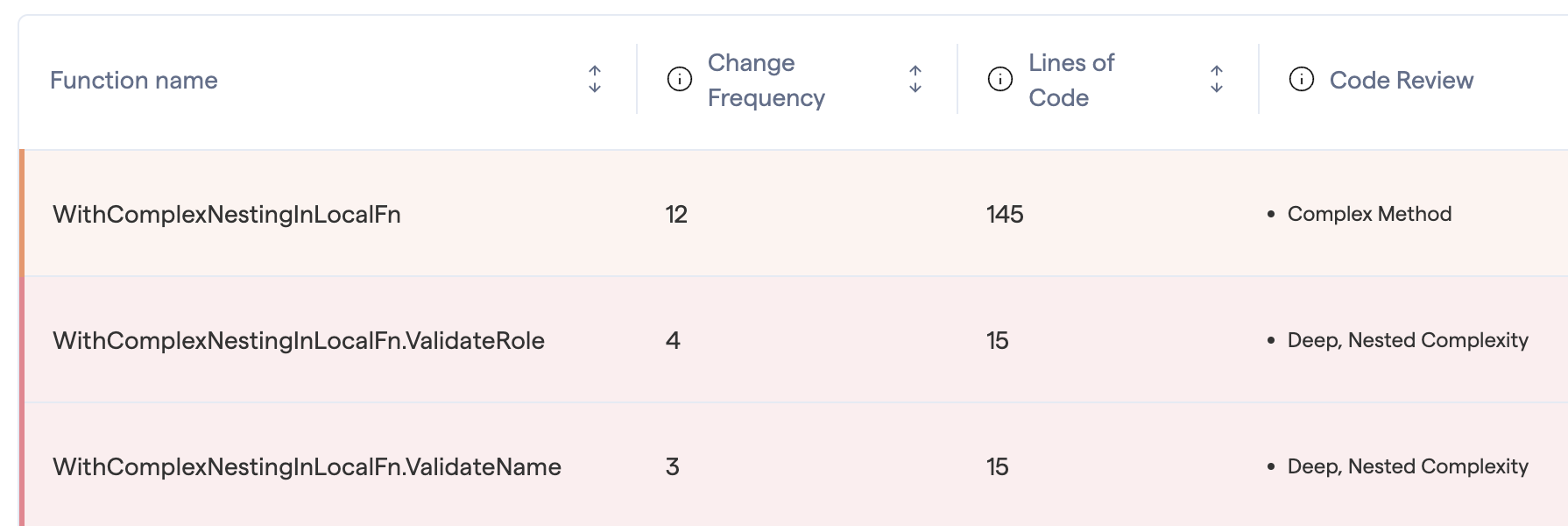Supported Programming Languages¶
CodeScene supports different programming languages at different levels:
1. Basic: All text-based content can be analysed on the file level. This enables hotspot analyses, change coupling, and knowledge metrics.
2. X-Ray with method level hotspots: The second level of support is CodeScene’s language aware X-Ray analysis that calculates hotspots and change coupling on a function/method level.
3. Full support: Full language support means that CodeScene calculates Code Health metrics, enables the virtual code reviewer, and supports the goal-oriented workflow concept to manage technical debt and code quality.
Language Specific Features¶
CodeScene has dedicated language support for the following programming languages:
Language |
Full support |
X-Ray (method level hotspots) |
|---|---|---|
C |
Yes |
Yes |
C++ |
Yes |
Yes |
C# |
Yes |
Yes |
Java |
Yes |
Yes |
Groovy |
Yes |
Yes |
JavaScript |
Yes |
Yes |
TypeScript |
Yes |
Yes |
React (jsx, tsx) |
Yes |
Yes |
ECMAScript Modules |
Yes |
Yes |
Vue.js |
Yes |
Yes |
Objective-C 2.0 |
Yes |
Yes |
Scala |
Yes |
Yes |
Python |
Yes |
Yes |
Swift |
Yes |
Yes |
Go |
Yes |
Yes |
Dart2 |
Yes |
Yes |
Visual Basic .Net |
Yes |
Yes |
PHP |
Yes |
Yes |
Rust |
Yes |
Yes |
Ruby |
Yes |
Yes |
Rational Software Architect models (C++) |
Yes |
Yes |
Kotlin |
Yes |
Yes |
Perl 5 |
Yes |
Yes |
Erlang |
Yes |
Yes |
Elixir |
Yes |
Yes |
Clojure |
Yes |
Yes |
PowerShell |
Yes |
Yes |
TCL |
Yes |
Yes |
Apex (Salesforce) |
Yes |
Yes |
BrightScript |
Yes |
Yes |
BrighterScript |
Yes |
Yes |
Terraform |
No |
Yes |
Programming Language Details¶
The code health metric represents a general concept which applies across all supported languages. However, some details might vary. This section highlights any language specific analysis details.
C# Analysis Details¶
Local Functions: Local functions are a fairly recent addition to the C# language. A local function is simply a method defined inside another method:
private void Process(string?[] lines, string mark)
{
foreach (var line in lines) // Here's some logic in the enclosing function...
{
if (IsValid(line)) // ...and we encapsulate details in a local function.
{
// Processing logic...
}
}
bool IsValid([NotNullWhen(true)] string? line) // <-- local function.
{
return !string.IsNullOrEmpty(line) && line.Length >= mark.Length;
}
}
CodeScene treats local functions as first-class analysis elements. This means that a code smell inside a local function is reported there (e.g. IsValid in the example above); not on the enclosing method (e.g. Process). Similiarly, this also allows you to view local functions as separate priorities in the X-Ray analysis. Here’s an example:

Fig. 273 The X-Ray analysiss prioritizes C# local functions too. (See ValidateRole and ValidateName).¶
C++ Analysis Details¶
Unit Test Frameworks: CodeScene supports two formal C++ Unit Test frameworks:
Microsoft Unit Testing Framework
GoogleTest
This means that CodeScene will recognize the test methods as well as analyze the assertion patterns in the test methods. The purpose of the assertion analysis is to identify test-specific smells like large assertion blocks and duplicated assertion blocks. These findings are included in the Code Health calculation and accessible via the virtual code review and X-Ray for each test file.
Lack Support for a specific Programming Language?¶
We continue to add support for more programming languages over time. As always: if you lack support for a language, let us know and we will make it happen.